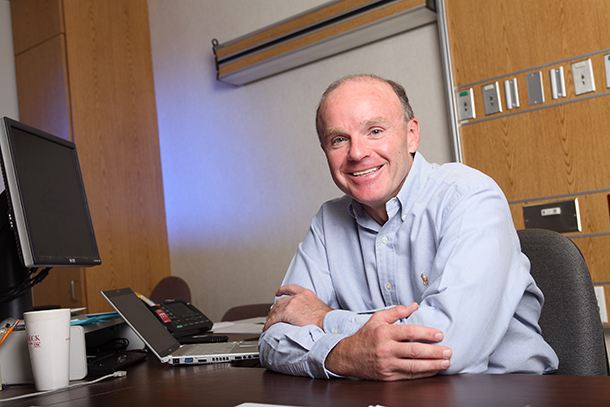Thomas A. Buchanan, MD, is professor of medicine, obstetrics and gynecology, and physiology and biophysics; vice dean for research; and chief of the division of endocrinology and diabetes in the Department of Medicine at the Keck School of Medicine at USC. He also is the founding director of the Southern California Clinical and Translational Science Institute.
On April 17, Buchanan was presented with the Associates Award for Creativity in Research during the university’s 2017 Academic Honors Convocation.
The Associates Award represents the highest honor the university faculty can bestow on its members for distinguished intellectual and artistic achievements. Buchanan recently sat down with HSC News to share his thoughts on research, teaching and the importance of creativity in science.
Question: Your research has been instrumental in creating a better understanding of how diabetes Type 2 evolves, and how to prevent it. What first attracted you to this kind of research?
Answer: I have always been interested in the biology and pathophysiology of disease. I started out studying those aspects of diabetes during pregnancy. But I soon observed that most women who had mild (known as gestational) diabetes during pregnancy went on to develop type 2 diabetes. I realized that was a really important problem and changed my focus to understanding and prevention type 2 diabetes.
Q: You’re being awarded for the creativity that you bring to your research. Can you talk a little about that? What does it mean to be creative in a scientific field? Why is this important?
A: Creativity may be different things to different people. To me, it involves the ability to think beyond conventional wisdom, imagine new explanations for research observations, and design and conduct studies that take a field in a new direction. Creativity is important because human biology and health are incredibly complex; today’s knowledge is often only partially correct and sometimes actually wrong. Only through creativity can we get to new and better understandings that let us improve health care and health.
Q: Do you get to exercise your creativity in other areas of your life?
A: I suppose the best example outside of science is photography, especially underwater photography where the creativity involves composition, lighting – and a lot of patience. I have a small gallery of my favorite pictures in my office. It reminds me that there is more than work in this world – even though I do love my work.
Q: How do you encourage creativity in your students?
A: Particularly for people who have trained in medicine, where there is a lot of emphasis on right answers, it starts with getting them comfortable with the possibility of being wrong – and still succeeding ultimately. Once that barrier is crossed, they can begin to experience the freedom to try new ideas, but always with the discipline of testing them rigorously to see if they are right. I also try to convey the optimism that mother nature does have right answers and that they can find them.
Q: What are you most excited about in your current research? What has surprised you the most?
A: These days I don’t have as much time to do research as I would like. But when I do, the excitement is understanding how it is that being overweight causes people to develop diabetes. There have been huge advances in the understanding of obesity in the past decade. Fat does not just store calories, it secretes many hormones and metabolites that can affect other organs in the body. Our work has shown that excess fat is a main driving force behind failure of the body’s insulin secreting cells. That failure leads to diabetes. Understanding how fat does this and fixing the problem is fundamental to widespread diabetes prevention.
Q: You’ve been a champion of translational research for much of your career. How has it evolved over the years?
A: Only a decade ago, when we first started talking about establishing a Clinical and Translational Science Institute at USC, many researchers asked why we would want to do such a thing. They viewed basic discovery research as real science, everything else was derivative. These days, the conversation is always about how to do translation. That is a genuine culture change that greatly increases the impact of research on health, which in my view is what medical research should be about.
— Leigh Bailey


